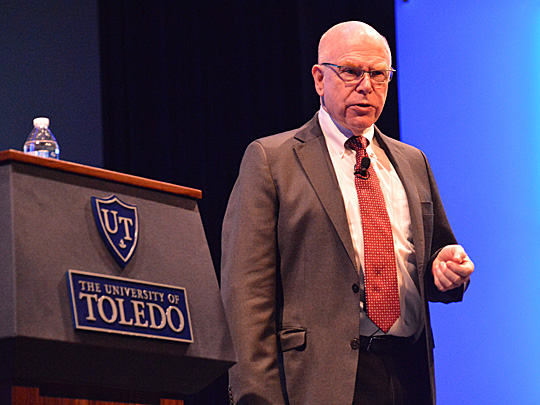It is not possible to have a good strategy without first diagnosing the problem, business expert Richard Rumelt told the crowd at the third address in the inaugural Jesup Scott Honors College Lecture Series.

Richard Rumelt shared his business expertise last week in Doermann Theater during a Jesup Scott Honors College Lecture.
Too often what some call strategy is in reality just “fluff.” Far too many institutions have broad statements that their mission is to delight customers and their strategy is to invest in growth, he said.
“You can’t have strategy without diagnosis. You cannot solve a problem you have not defined,” he added.
While it is important to clearly state a mission, values and goals, statement alone is not a strategy, said Rumelt, the Harry and Elsa Kunin Professor of Business and Society at the UCLA Anderson School of Management.
Developing good strategy starts with diagnosis and must include guiding policy and coherent action.
“When we see good strategy, we are surprised,” he said.
One reason there is so much bad strategy is the concept of “new thought” — that if you think something hard enough it will happen. It’s just not true, Rumelt said. Political pressures also make it difficult to sufficiently diagnosis a problem or grant individuals the appropriate power to act.
Rumelt used a variety of examples from both his consulting experiences and popular culture to relate his concepts to the audience. Steve Jobs reorganizing Apple in the 1990s was a clear strategy to cut the business down to its core in order to survive. eHarmony uses its detailed registration process to include only people who are serious about finding a mate.
While strategy is a concept dating back to ancient Rome, it remains in a state of confusion. Rumelt’s suggestion for young people or new companies is to consider their ambition, goals and values, then identify specific challenges that are reasonably achievable.
“It’s not about what do I wish. It’s about this balance between importance and doability,” he said. “Choice is not easy. It’s about saying no to a bunch of things and yes to something else.”
Rumelt has been voted one of the world’s Top 50 Business Thinkers by the Thinkers50 program sponsored by the Harvard Business Review. He maintains a multifaceted career in teaching, research and consulting, with the focus on competitive advantage and strategy, industry dynamics and overall management.
Rumelt’s book Good Strategy/Bad Strategy: The Difference and Why It Matters helped guide the content of the UT Main Campus strategic plan “Imagine 2017.”
The Jesup Scott Honors College Lecture Series kicked off in September with education innovator Salman Khan, founder of Khan Academy, and in November UT heard from political consultant James Carville. Arizona State University President Michael Crow will deliver the final lecture of the academic year Monday, March 10.
Visit utoledo.edu/honorslecture to order tickets and learn more.